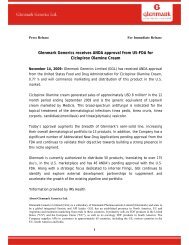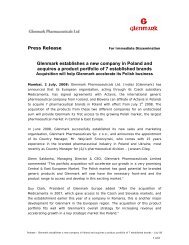Glenmark
Glenmark
Glenmark
You also want an ePaper? Increase the reach of your titles
YUMPU automatically turns print PDFs into web optimized ePapers that Google loves.
multiple and possibly overlapping tax structures. In addition, we may face competition in other countries<br />
from companies that may have more experience with operations in such countries or with international<br />
operations generally. We may also face difficulties integrating new facilities in different countries into our<br />
existing operations, as well as integrating employees that we hire in different countries into our existing<br />
corporate culture. If we do not effectively manage our international operations and the operations in these<br />
subsidiaries, we may lose money in these countries and it may adversely affect our business and results of<br />
operations.<br />
We have made and may in the future make additional capital commitments to subsidiaries, joint ventures<br />
and associates, affecting our liquidity and capital resources.<br />
We have made and continue to make significant capital investments, loans, advances and other<br />
commitments to support certain of our subsidiaries, joint ventures and associates. We may make additional<br />
capital expenditures in the future, which may be financed through additional equity or debt, including<br />
through the debt of subsidiaries and joint ventures. If the business and operations of these subsidiaries and<br />
joint ventures do not perform as expected, we may not derive the anticipated benefits or our investments<br />
may be required to be written down or written off. Additionally, certain loans and advances due to us may<br />
not be repaid or may need to be restructured or we may be required to outlay further capital under our<br />
commitments to support such companies. See also “Management's Discussion and Analysis of Financial<br />
Condition and Results of Operations”.<br />
Actual demand for our products may vary from anticipated or required levels resulting in over -<br />
production of our products.<br />
If demand from our partners and/or customers slows, we could, in the future, produce quantities of our<br />
formulations and API in excess of actual demand. A number of factors may reduce the end-user demand for<br />
our products including an over-supply on account of increased competition, among other things. Although<br />
we have capabilities to store certain levels of excess output, a sustained decrease in demand from our<br />
partners may result in us being required to cease production for a period of time, which may have an<br />
adverse effect on business, financial condition and results of operations.<br />
Various factors could adversely affect our expected production levels and production costs..<br />
Manufacturers of pharmaceutical products such as our formulations and API often encounter difficulties in<br />
production. These problems include difficulties with production costs and yields, product quality (caused<br />
by, among other things, process failure, equipment failure, human errors or other unforeseen events during<br />
the production cycle) and shortages of qualified personnel, as well as compliance with regulatory<br />
requirements, including current Good Manufacturing Practice (“cGMP”) requirements. Because of the<br />
many steps involved in the production of our products, any interruption in one of the steps in the<br />
manufacturing process could cause resultant delays in the entire production cycle. In addition, any material<br />
labor problems, such as a work stoppage or mechanical failure or malfunction could lead to delays in<br />
production. Any of these problems could cause us to delay or suspend our production and may entail higher<br />
costs or other significant damages. Furthermore, if our suppliers fail to deliver necessary manufacturing<br />
equipment or raw materials or adequately perform the services we outsource to them, we would likely be<br />
unable to meet production deadlines and might be in breach of our supply and license agreements, which<br />
could have a material adverse effect on business, financial condition and results of operations.<br />
If there are delays and/or failure in supplies or variation in costs of raw materials, services or finished<br />
goods from third parties, we might be unable to meet our production needs which may adversely affect<br />
our business and results of operations.<br />
In some of our key business operations, such as the manufacture, formulation and packaging of products,<br />
we rely on and have regular supply contracts with third parties for the timely supply of specified raw<br />
materials, equipment, contract manufacturing, formulation or packaging services and maintenance services.<br />
In addition, many of our products are dependent on highly specialised raw materials and as an increasing<br />
number of our products will be sold in the regulated markets we will need to source substantially all of our<br />
11



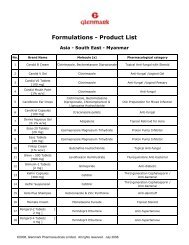
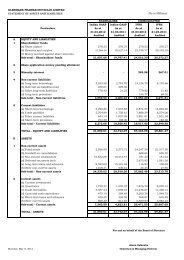
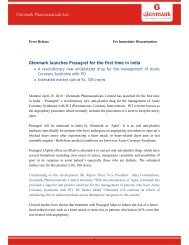
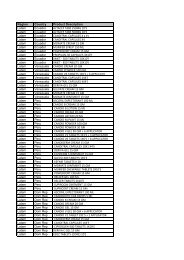
![Formulations [India] â Product List - Glenmark](https://img.yumpu.com/46601329/1/190x245/formulations-india-a-product-list-glenmark.jpg?quality=85)
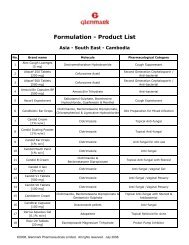
![Formulation [India] â Product List - Glenmark](https://img.yumpu.com/44013338/1/190x245/formulation-india-a-product-list-glenmark.jpg?quality=85)
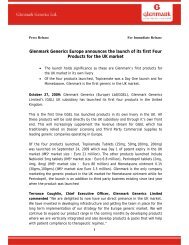

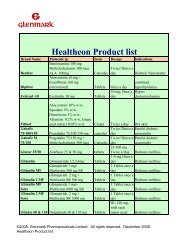
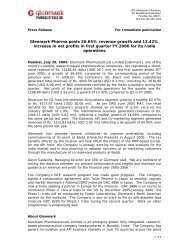

![Formulations [India] â Product List - Glenmark](https://img.yumpu.com/35994839/1/190x245/formulations-india-a-product-list-glenmark.jpg?quality=85)
